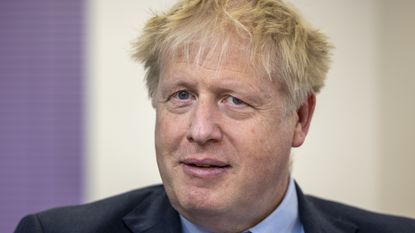Will Boris Johnson survive the fallout from Sue Gray’s report?
Five more Tory MPs call for prime minister to resign over Partygate

Boris Johnson has resisted calls to resign following the publication of Sue Gray’s report into lockdown-breaking Downing Street parties.
The senior civil servant found that there had been “failures of leadership and judgement in No. 10 and the Cabinet Office” for which “the senior leadership at the centre, both political and official, must bear responsibility”.
In a statement to the Commons after the publication of the report, the prime minister said he had been “humbled and I have learned a lesson”. But he denied ever knowingly misleading MPs about parties in Downing Street and sought to justify his attendance at a leaving party event because he considered it a part of his work.
Subscribe to The Week
Escape your echo chamber. Get the facts behind the news, plus analysis from multiple perspectives.

Sign up for The Week's Free Newsletters
From our morning news briefing to a weekly Good News Newsletter, get the best of The Week delivered directly to your inbox.
From our morning news briefing to a weekly Good News Newsletter, get the best of The Week delivered directly to your inbox.
No ‘smoking gun’?
Gray’s report is certainly “damaging” for the prime minister, said political editor Kevin Schofield on HuffPost. But it was “not fatal”.
The revelations contained in the report may have been “embarrassing”, revealing a “debauched culture inside Downing Street, with red wine on the walls and staffers drinking so much that they threw up”, he said. But in the end there was “no smoking gun about Johnson’s personal involvement”.
The Independent said that “three more Conservative MPs have submitted letters of no confidence” in Johnson after the publication of Gray’s report, bringing the number of letters believed to have been submitted to the chair of the 1922 committee to 21.
But that total is far from the 54 letters needed to bring about a no-confidence vote in the prime minister. And any plotting to move against Johnson is proceeding at glacial pace compared to “the sound and fury that characterised the one against Theresa May”, said The Guardian’s chief political correspondent Jessica Elgot.
While those meetings took “took place in crammed and sweaty meeting rooms and with public denunciations in front of amassed journalists”, the few “hoping to oust this prime minister tend to meet in pairs over bottles of wine in the Adjournment cafe or catch a quiet word in a corridor”, she added.
But while his own party remains ambivalent over whether to oust him, the British public seems much more certain that he should go. Some two-thirds of people believe he should resign given the findings from Gray’s report, according to a snap poll from Savanta ComRes.
No replacement for Johnson
The main reason Johnson’s allies believe he can weather the storm created by Gray’s findings “goes beyond the report’s contents”, said Katy Balls in The Guardian.
The Spectator’s deputy political editor said the “biggest reason” MPs will keep him in Downing Street “is the lack of an obvious replacement”, which means many Conservative members “backing him reluctantly”.
The report “may not change his position”, she added, but “it will add to concerns about the miserable situation the Tory party is now in”.
And he is likely to be “shielded” further by the war in Ukraine, with many Tory MPs – including some of his “most fervent critics” – claiming that a leadership contest cannot happen while the Russian invasion is ongoing, said the i news site.
However, there are “millions of people” in the UK who believe Johnson has a “spark of political genius”, and is someone who can be “a force for good despite his managerial shortcomings”, said Stephen Glover in the Daily Mail. The question now is if he has “forfeited” the support of those millions “as a result of his behaviour over Partygate”.
Many “inveterate Boris fans” will “scoff” at the idea, Glover added, believing that by the next election “the shenanigans in No 10 will have faded from the public memory and people will only care about tax and the cost of living”.
Yet “many reasonable people will reflect that it was Boris Johnson who presided over these Bacchanalian excesses, and must therefore bear ultimate responsibility for them”.
Create an account with the same email registered to your subscription to unlock access.
Sign up for Today's Best Articles in your inbox
A free daily email with the biggest news stories of the day – and the best features from TheWeek.com
Sorcha Bradley is a writer at The Week and a regular on “The Week Unwrapped” podcast. She worked at The Week magazine for a year and a half before taking up her current role with the digital team, where she mostly covers UK current affairs and politics. Before joining The Week, Sorcha worked at slow-news start-up Tortoise Media. She has also written for Sky News, The Sunday Times, the London Evening Standard and Grazia magazine, among other publications. She has a master’s in newspaper journalism from City, University of London, where she specialised in political journalism.
-
 Shardlake: a 'tightly plotted, gorgeously atmospheric piece of television'
Shardlake: a 'tightly plotted, gorgeously atmospheric piece of television'The Week Recommends Arthur Hughes captivates in this 'eminently watchable' Tudor murder mystery
By Irenie Forshaw, The Week UK Published
-
 Major League Baseball is facing an epidemic of pitcher's injuries
Major League Baseball is facing an epidemic of pitcher's injuriesUnder the Radar Many insiders are blaming the pitch clock for the rise in injuries — but the league is not so sure
By Justin Klawans, The Week US Published
-
 8 movie musicals that prove the screen can share the stage
8 movie musicals that prove the screen can share the stageThe Week Recommends The singing and dancing, bigger than life itself
By Scott Hocker, The Week US Published
-
 Is David Cameron overshadowing Rishi Sunak?
Is David Cameron overshadowing Rishi Sunak?Talking Point Current PM faces 'thorny dilemma' as predecessor enjoys return to world stage
By The Week UK Published
-
 Will Aukus pact survive a second Trump presidency?
Will Aukus pact survive a second Trump presidency?Today's Big Question US, UK and Australia seek to expand 'game-changer' defence partnership ahead of Republican's possible return to White House
By Sorcha Bradley, The Week UK Published
-
 Can Boris Johnson save Rishi Sunak?
Can Boris Johnson save Rishi Sunak?Today's Big Question Former PM could 'make the difference' between losing the next election and annihilation
By The Week UK Published
-
 It's the economy, Sunak: has 'Rishession' halted Tory fightback?
It's the economy, Sunak: has 'Rishession' halted Tory fightback?Today's Big Question PM's pledge to deliver economic growth is 'in tatters' as stagnation and falling living standards threaten Tory election wipeout
By Harriet Marsden, The Week UK Published
-
 Why your local council may be going bust
Why your local council may be going bustThe Explainer Across England, local councils are suffering from grave financial problems
By The Week UK Published
-
 Rishi Sunak and the right-wing press: heading for divorce?
Rishi Sunak and the right-wing press: heading for divorce?Talking Point The Telegraph launches 'assault' on PM just as many Tory MPs are contemplating losing their seats
By Keumars Afifi-Sabet, The Week UK Published
-
 How would a second Trump presidency affect Britain?
How would a second Trump presidency affect Britain?Today's Big Question Re-election of Republican frontrunner could threaten UK security, warns former head of secret service
By Harriet Marsden, The Week UK Published
-
 'Rwanda plan is less a deterrent and more a bluff'
'Rwanda plan is less a deterrent and more a bluff'Instant Opinion Opinion, comment and editorials of the day
By The Week UK Published